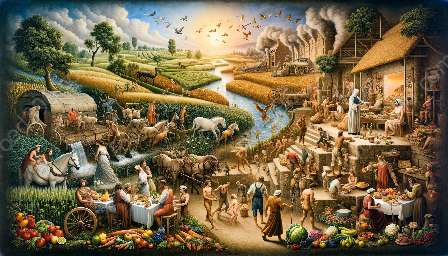Farming has been an integral part of human civilization for millennia, shaping our societies, cultures, and environments. In this comprehensive guide, we will delve into ancient farming techniques, their historical developments in food production and agriculture, and their impact on food culture and history.
The Origins of Agriculture
The journey of agriculture began over 10,000 years ago, marking a significant shift in human history as hunter-gatherer societies transitioned to settled agricultural communities. This shift allowed humans to cultivate and domesticate plants and animals, leading to the development of ancient farming techniques.
Early Farming Practices
Ancient farming techniques varied across different regions, depending on factors such as climate, soil conditions, and available resources. In Mesopotamia, the cradle of civilization, irrigation systems were developed to manage water resources for farming, while the ancient Egyptians utilized the annual flooding of the Nile River to enrich their agricultural lands.
Furthermore, the invention of the plow revolutionized farming, allowing for more efficient soil cultivation and crop production. Other techniques, such as crop rotation and the use of natural fertilizers, were also employed to enhance agricultural yields.
The Rise of Food Production and Agriculture
As ancient farming techniques advanced, food production and agriculture underwent significant historical developments. Civilizations such as the Indus Valley, ancient China, and Mesoamerica developed elaborate farming systems and introduced new crops that eventually spread across the world.
The domestication of animals also played a crucial role in food production, providing sources of meat, milk, and labor for agricultural activities. These developments laid the foundation for the expansion of global food networks and the exchange of culinary traditions, shaping food culture and history.
The Impact on Food Culture and History
Ancient farming techniques not only sustained communities but also influenced food culture and history in profound ways. The cultivation of specific crops and the development of culinary practices became defining elements of various societies, forming the basis of regional cuisines and traditional farming rituals.
Legacy and Modern Innovations
Despite the passage of centuries, many ancient farming techniques continue to influence modern agricultural practices. Sustainable farming methods, crop diversity preservation, and indigenous farming knowledge are being rediscovered and integrated into contemporary food production, reflecting a renewed recognition of the value of traditional farming wisdom.
By understanding the historical developments in food production and agriculture, as well as the deep-rooted connections between ancient farming techniques and food culture, we gain a deeper appreciation for the traditions and innovations that have shaped our world, both past and present.
Embark on this journey into the ancient world of farming as we unravel the timeless wisdom and enduring legacies of early agricultural practices.

